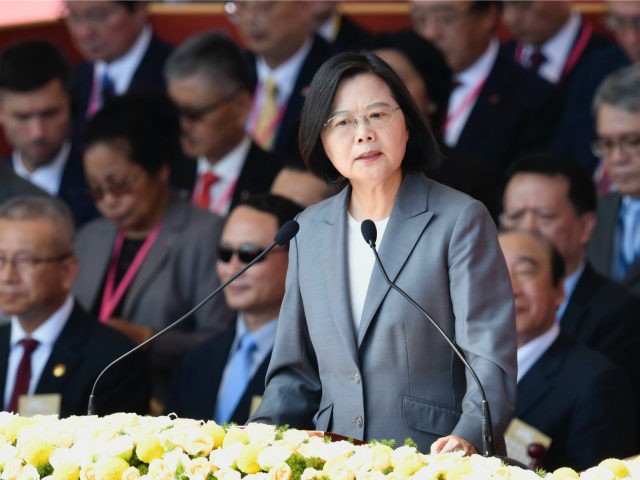The legislature of Taiwan on Tuesday passed an “anti-infiltration” bill designed to reduce political activity by hostile foreign governments – primarily, but not specifically limited to, China.
Opponents worried the bill could be used to criminalize legitimate political dissent and accused the governing Democratic Progressive Party (DPP) of quickly pushing it through the legislature without proper debate.
The opposition Kuomintang (KMT) party protested the bill and boycotted the votes held during its review process. KMT legislators staged a sit-in protest in front of the speaker’s podium wearing black masks and waving signs that accused the anti-infiltration bill of “damaging human rights.”
Another opposition party, People First (PFP), complained the bill was pushed through the legislature in just one month, leaving little time for careful review of its provisions or vigorous debate.
Some opponents said the bill would damage relations with Beijing, which indicated severe displeasure with the legislation and might be inclined to vent its anger on Taiwanese working in China. President Tsai Ing-wen shot back that authoritarian China has no standing to criticize Taiwan’s respect for democracy and free speech.
The DPP argued the new legislation was needed quickly to protect the January 11 presidential election from outside influence, rather obviously meaning Chinese influence, although the administration of President Tsai took pains to point out that all governments that seek to undermine Taiwan’s sovereignty are banned from funding political “infiltration sources” ranging from political parties to non-governmental organizations.
Some DPP legislators were quite candid that Beijing is the primary target of the bill.
“The rise of China has posed a threat to all countries, and Taiwan is facing the biggest threat. Taiwan is on the front line of Chinese infiltration and urgently needs the anti-infiltration law to protect people’s rights,” said DPP lawmaker Chen Ou-po after the bill was passed by a 67-0 vote, with Kuomintang abstaining.
The bill prohibits entities classified as “infiltration sources” from making political donations, initiating referendums, or otherwise influencing Taiwanese elections. Critics worried that legitimate opposition activities could be defined as “infiltration sources” and banned, particularly if they involved the sizable number of Taiwanese citizens living in China. The DPP gave assurances that Taiwanese living in China would not be discriminated against.
There was some muttering from the opposition that the DPP rammed the bill through quickly because it fears losing seats in the January election. Current indications are that President Tsai will win re-election easily, possibly by even more than her 25-point margin of victory in 2016. The most recent media poll had Tsai at 45 percent, with KMT candidate Han Kuo-yu at 29 percent and PFP candidate James Soong at 7 percent.
A poll taken immediately before the final presidential debate put Tsai at 49 percent against Han’s 15 percent, with Soong hovering at roughly the same 7 percent level, while a few other surveys gave Tsai a 25-point lead or more, suggesting either that the new poll is an outlier or Han improved his position considerably during the debate. No poll over the past few weeks has shown Tsai with less than a double-digit lead over Han. Polling in this election has been particularly difficult because Han famously instructed his supporters to lie to pollsters.

COMMENTS
Please let us know if you're having issues with commenting.